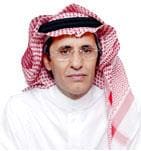Dr. 'Ali Sa'd Al-Moussa, a columnist for the Saudi daily Al-Watan, wrote on August 22, 2016 that the blood-soaked conflicts and struggles raging across the Arab world have nothing to do with Israel, and that blaming Israel for them is shallow. Al-Moussa wrote with nostalgia about the flowering of culture that took place in some Arab countries in the 1950s, contrasting it with the ignorance and extremism that are rampant there now. He argued that this decline, rather than Israel, is to blame for the devastation and ruin in today's Arab world.
The following are excerpts from his article:[1]

Dr. 'Ali Sa'd Al-Moussa (Image: Al-Watan, Saudi Arabia)
"[The world outside] the blood-soaked region between Mosul, [Syria] and Sirt, [Libya], and between Idlib, [Syria] and 'Aden, [Yemen], does not see even a tenth of the strife [that goes on in that region]... not even between the two Koreas or between the Hutu and the Tutsi in Africa. This proves that the world could have been a safer and quieter place had the Middle East not been in its midst. And I ask that none of you place the blame for this on Israel, for that is [just] a shallow excuse. Israel has nothing to do with the struggle between ISIS and [Jabhat] Al-Nusra, or with what is happening between 'Afash [a nickname for former Yemeni president 'Ali Abdullah Saleh], ['Abd Al-Malik] Al-Houthi [head of the Houthi Ansar Allah group in Yemen] and the Yemeni government, and has nothing to do with the ideological war that is raging in the distant deserts of Libya.
"We in this blood-red region on the world map are born [carrying] the gene of an unknown virus in our body, which soon awakens and multiplies, [triggering] destruction and war, hatred, exclusion and the despicable categorizing [of people]. In the last five years of internecine [fighting], we have killed tens of times more people from our own ranks than were killed in 50 years of historical wars with Israel.
SUPPORT OUR WORK

"So who is to blame for this? The culprit is the awakening of ignorance[2] ... Before [Israel] was even born, when it was just an idea and promises on paper, the situation of us [Arabs] was as follows: Egypt had the first printing press outside Europe, even before Japan and China had one. It was also the world's third-largest producer of films. In the mid-1950s Beirut had 50 private libraries, more than in any French city except Paris. In the same period, Tunisia could boast that every single boy there attended a modern public school, whereas today, paradoxically, Tunisia is the country that provides the largest number of young men for ISIS. This is the awakening of ignorance. The Gordon Medical College in Sudan[3] was ranked seventh among the advanced medical colleges in the world, above Yale, Princeton and the Sorbonne. It's a shame that, with this [kind of] historical heritage, Gordon [College] - now [called] the University of Khartoum - suffices with taking visitors to see a museum where [it] exhibits the faded document [recording] its high place in the global ranking of universities.
Throughout the second half of the 20th century, Kuwait was a shining beacon [of culture] that published outstanding cultural magazines. The famous Al-'Arabi magazine circulated 500,000 copies and there wasn't a single Arabic village it didn't reach. Today if you ask the young person nearest to you, 'What do you know about Kuwait?', his only answer will be that it produces oil.
"In sum, not [only] are we born [carrying] the gene of the unknown virus of war, which comes to life the minute an Arab youth is able to carry a dagger or a sword, we are also born with the fly of sleeping [sickness], from which the Arab awakes [only] as part of the awakening of ignorance."
Endnotes:
[1] Al-Watan (Saudi Arabia), August 22, 2016.
[2] The author is hinting at Al-Sahwa Al-Islamiyya (Islamic Awakening), a movement formed in the 1980s by a group of Saudi clerics including Salman Al-'Oudah, 'Aid Al-Qarni, Safar Al-Hawali, Nasser Al-'Omar and Sa'd Al-Barik. Its ideology combined Salafi-Wahhabi religious principles with socio-political perceptions of the Egyptian Muslim Brotherhood. The movement gained influence in Saudi society and even in the Saudi education system as long as it did not oppose the Saudi regime. However, in the early 1990s it rocked the political system by instigating protests and demonstrations in demand of reform, in particular the establishment of a Shura Council. The movement's activity ceased in 1995..
[3] Named after Charles George Gordon (1833 - 1885), a British Army officer and administrator who was killed in Khartoum in 1885.




